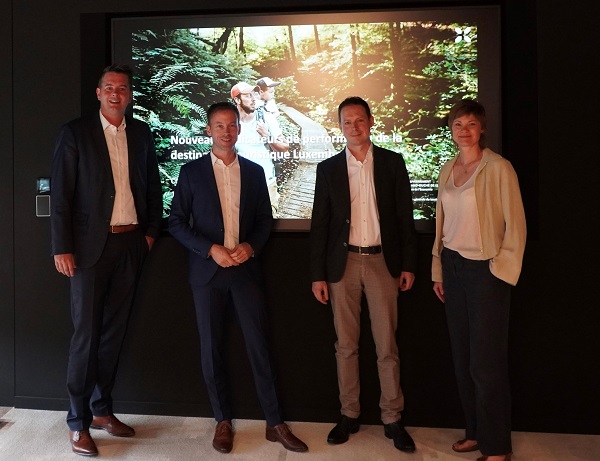 (L-R) Lex Delles, Luxembourg's Minister for Tourism; Dr Sebastian Reddeker, CEO of LFT; Alain Krier, Head of Insights & Strategy at LFT; Sarah Pitt, head of communication and social media at LFT;
Credit: MECO
(L-R) Lex Delles, Luxembourg's Minister for Tourism; Dr Sebastian Reddeker, CEO of LFT; Alain Krier, Head of Insights & Strategy at LFT; Sarah Pitt, head of communication and social media at LFT;
Credit: MECO
On Tuesday 18 July 2023, Luxembourg's Minister for Tourism, Lex Delles, the CEO of Luxembourg for Tourism, Dr Sebastian Reddeker, and the Head of Insights & Strategy of Luxembourg for Tourism, Alain Krier, presented the new performance indicators for Luxembourg as a tourist destination.
Minister Delles first pointed out that the tourism strategy of Luxembourg's General Directorate for Tourism provides for the implementation of regular and targeted monitoring in order to be able to analyse the evolution of the sector as well as to evaluate and, if necessary, adapt the measures and activities provided for in this strategy. In this context, the Tourism Minister presented a new survey which highlights how residents and cross-border workers perceive and assess the tourist offer in Luxembourg. 77% of respondents said they were satisfied with this offer, more than half of respondents said they believed that Luxembourg was more attractive as a tourist destination now than before the COVID-19 pandemic and 74% said that tourism has a positive influence on the quality of life in Luxembourg.
Dr Sebastian Reddeker and Alain Krier emphasised that the success of a destination is measured through qualitative performance indicators, which Luxembourg for Tourism (LFT) has adopted and which are expected to allow tourism players to react in an agile way to the challenges of the sector. LFT has supplemented its market surveys with new data sources (e.g. mobile phone data, online reputation analysis). The objective is to no longer be limited to tourist arrivals and overnight stays, but to follow the entire journey of visitors, in order to obtain a more complete picture of their travel needs and behaviour.
The performance of Luxembourg as a tourist destination has been summed up in six key messages:
1. Visitor expectations are exceeded: according to the General Directorate for Tourism, visitors to Luxembourg are characterised by their strong orientation towards quality rather than price. Despite these high standards, Luxembourg as a destination has been able to win over its visitors, two-thirds of whom were "completely" satisfied with their stay and 42% of whom saw their expectations positively exceeded. This share was even higher among first-time visitors, half of whom were strongly inclined to return for a future visit.
2. Travel experience in Luxembourg - connection with nature and moments of happiness: this high degree of satisfaction is reportedly based on many experiences to be enjoyed in Luxembourg that resonate with the motivations of visitors: to have fun, to disconnect, to immerse oneself in the destination by travelling in a more attentive way.
3. Sustainable growth with high added value: to ensure the quality of experience in the long term, the General Directorate for Tourism deemed it essential to focus on sustainable growth with high added value. For example, spending by visitors has steadily increased over the last decade (€114 per person/day in 2017, compared to €144 per person/day in 2022). Between 2021 and 2022, this grew by 17% - faster than inflation. In terms of sustainability, visitors certified that the tourist offer performed above the European average on the evaluation platforms.
4. Overtourism not (yet) a problem in Luxembourg: only 2% of visitors considered Luxembourg to be overcrowded. The tourist intensity in Luxembourg remained below the European average. It was highest in Vianden, but remained far below that of places frequented abroad. Digital tools and the storytelling approach reportedly contributed to distributing tourist flows in space and time, thus avoiding overtourism phenomena.
5. Residents support tourism in Luxembourg: 72% of residents said they support tourism in Luxembourg and 74% considered the impact of tourism on the quality of life to be positive.
6. Tourism contributes significantly and positively to the image of the country: according to the General Directorate for Tourism, a strength of tourism also lies in its ability to contribute positively to Luxembourg's brand image. LFT studies highlighted the gap in perceived sympathy, visit intentions and positive associations between those having already visited the country and those who have not. For example, 83% of visitors considered Luxembourg to be a friendly place.
The General Directorate for Tourism concluded that these key messages (and the indicators associated with them) have confirmed that the Luxembourg tourist destination is committed to the path of even more sustainable, qualitative and beneficial tourism for visitors, residents and the local economy. LFT has reportedly acquired the necessary tools to constantly monitor progress on this path and to identify new future opportunities for the tourist destination.








